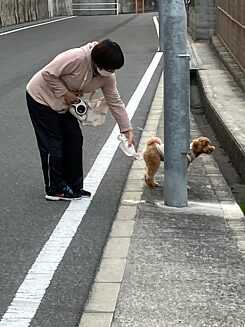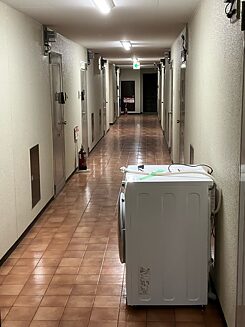Word! The Language Column
Amaeruing Washing Machines and the Friendly Face of Shame

On his recent trip to Japan, Jan Snela learned about the concept of amae That gives kids – and even washing machines – licence to occasionally run amok.
By Jan Snela
When I was a kid and robots were still the fairly exotic preserve of sci-fi-savvy nerds, I got a big kick out of playing an out-of-control robot. I’d lurch around the room like a mechanical ballerina, careening faster and faster and – long before GPS learned to speak – repeating as robotically as I could, “Out-of-con-trol-out-of-con-trol...” Everything would whirl round and round in the centrifuge of my self-induced vertigo, spinning out of control – and out of an all-too-static world – to culminate in a guaranteed collapse with a resounding crash on the floor.
Wilful excess
One Eurocentric – i.e. narrow-minded – but still prevalent view of the Japanese is that of a highly disciplined, ant-like people with no individual life vis-à-vis the collective. If you delve into Japanese culture, on the other hand, sooner or later you’ll come across a contrasting phenomenon: their general penchant for excess in one form or another. To give just one example, I’ve been told that anyone who doesn’t go a little bonkers when boozing is regarded as abnormal in Japan. The Japanese language even has a word for this indulgence of excesses, this licence to go a little loopy: “amae” (甘え). Kids don't have to be good
| Photo: Jan Snela
Literally, amae means a kind of dependence, specifically the indulgence granted by Japanese parents to their children, letting them get away with stuff that seems inconceivable to Western sensibilities. The term was popularized by Japanese psychologist Takeo Doi in his bestseller The Anatomy of Dependence. I myself came across it in a book called Hito to Hito no Aida (Between Person and Person) by psychiatrist Bin Kimura, which describes how the Japanese regard one another – in relationships, for example – more as exceedingly changeable weather systems that can swing from sunshine to typhoon in a heartbeat than as predictable and reliable equals. Despite their proverbial preoccupation with “saving face” in social contexts, the Japanese are also allowed ample leeway to “totally lose it”, according to Bin Kimura, in more intimate contexts. When someone goes bonkers, their familiars let them “amaeru” – that’s the verb form of amae.
Kids don't have to be good
| Photo: Jan Snela
Literally, amae means a kind of dependence, specifically the indulgence granted by Japanese parents to their children, letting them get away with stuff that seems inconceivable to Western sensibilities. The term was popularized by Japanese psychologist Takeo Doi in his bestseller The Anatomy of Dependence. I myself came across it in a book called Hito to Hito no Aida (Between Person and Person) by psychiatrist Bin Kimura, which describes how the Japanese regard one another – in relationships, for example – more as exceedingly changeable weather systems that can swing from sunshine to typhoon in a heartbeat than as predictable and reliable equals. Despite their proverbial preoccupation with “saving face” in social contexts, the Japanese are also allowed ample leeway to “totally lose it”, according to Bin Kimura, in more intimate contexts. When someone goes bonkers, their familiars let them “amaeru” – that’s the verb form of amae. Clean peeing
| Photo: Jan Snela
Although I don’t belong to any of the clearly defined inner circles in Japan within which amae usually transpires, I can’t help thinking I actually benefited from this permission to presume on others’ indulgence. I wasn’t the one amaeruing, though, it was the washing machine in my holiday flat in Nara. During a previous load of laundry, I’d already noticed how heftily it heaved and jerked around the bathroom during the spin cycle – no less riotously than the out-of-control robot of my childhood. And yet I let it run a second time all the same – and even went out for a walk. While I was out and about, fascinated by the sight of a woman liquidating her dog’s droppings with a water bottle every time it relieved himself, the washer back in my rental was running riot. Alone at home, it apparently lurched around so heftily that it tumbled off its pedestal, punching a deep hole in the plaster wall of the bathroom and flooding the floor with water.
Clean peeing
| Photo: Jan Snela
Although I don’t belong to any of the clearly defined inner circles in Japan within which amae usually transpires, I can’t help thinking I actually benefited from this permission to presume on others’ indulgence. I wasn’t the one amaeruing, though, it was the washing machine in my holiday flat in Nara. During a previous load of laundry, I’d already noticed how heftily it heaved and jerked around the bathroom during the spin cycle – no less riotously than the out-of-control robot of my childhood. And yet I let it run a second time all the same – and even went out for a walk. While I was out and about, fascinated by the sight of a woman liquidating her dog’s droppings with a water bottle every time it relieved himself, the washer back in my rental was running riot. Alone at home, it apparently lurched around so heftily that it tumbled off its pedestal, punching a deep hole in the plaster wall of the bathroom and flooding the floor with water.
A world of shame, not guilt
 Washing machine: tired from rioting
| Photo: Jan Snela
Japanese culture is often somewhat ominously described as a culture of shame rather than guilt, in contrast to Western culture. I got a real taste of what that means when I reported the damage to the rental agency: no need to prove my innocence, not even a trace of any suspicion that it might have been my fault. Only the ardent hope that my stay wouldn’t be spoiled by this untoward incident. As if the Japanese knew their rampaging washing machines, like their rampaging kids, only too well. The very next morning, a dauntingly elegant trans woman (“Don’t worry, I’m not a man”) accompanied by two housewifely women showed up with a brand new washing machine (“Don’t worry, I’ll fix it tomorrow”). Were the exact same incident to occur in a German holiday rental, I’d be racked by an inner squabble between anger and guilt, those sibling rivals, for days on end. Here, on the other hand, was a mix of gratitude and humility – and decorous shame.
Washing machine: tired from rioting
| Photo: Jan Snela
Japanese culture is often somewhat ominously described as a culture of shame rather than guilt, in contrast to Western culture. I got a real taste of what that means when I reported the damage to the rental agency: no need to prove my innocence, not even a trace of any suspicion that it might have been my fault. Only the ardent hope that my stay wouldn’t be spoiled by this untoward incident. As if the Japanese knew their rampaging washing machines, like their rampaging kids, only too well. The very next morning, a dauntingly elegant trans woman (“Don’t worry, I’m not a man”) accompanied by two housewifely women showed up with a brand new washing machine (“Don’t worry, I’ll fix it tomorrow”). Were the exact same incident to occur in a German holiday rental, I’d be racked by an inner squabble between anger and guilt, those sibling rivals, for days on end. Here, on the other hand, was a mix of gratitude and humility – and decorous shame.The German Wikipedia article on amae points out that the excessive indulgence shown by Japanese culture towards this kind of dependence often rubs Westerners the wrong way. But it made me feel more at home in Japan than I’d ever felt perhaps anywhere else, with all the various home-grown courtesies and outbursts of anger to be found elsewhere on the planet.
Word! The Language Column
Our column “Word!” appears every two weeks. It is dedicated to language – as a cultural and social phenomenon. How does language develop, what attitude do authors have towards “their” language, how does language shape a society? – Changing columnists – people with a professional or other connection to language – follow their personal topics for six consecutive issues.